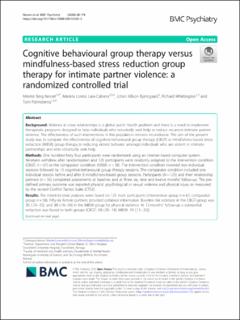| dc.contributor.author | Nesset, Merete Berg | |
| dc.contributor.author | Lara Cabrera, Mariela Loreto | |
| dc.contributor.author | Bjørngaard, Johan Håkon | |
| dc.contributor.author | Whittington, Richard | |
| dc.contributor.author | Palmstierna, Tom Krisman Kule | |
| dc.date.accessioned | 2021-04-26T13:52:45Z | |
| dc.date.available | 2021-04-26T13:52:45Z | |
| dc.date.created | 2020-12-19T15:37:12Z | |
| dc.date.issued | 2020 | |
| dc.identifier.citation | BMC Psychiatry. 2020, 20 (1), . | en_US |
| dc.identifier.issn | 1471-244X | |
| dc.identifier.uri | https://hdl.handle.net/11250/2739705 | |
| dc.description.abstract | Background
Violence in close relationships is a global public health problem and there is a need to implement therapeutic programs designed to help individuals who voluntarily seek help to reduce recurrent intimate partner violence. The effectiveness of such interventions in this population remains inconclusive. The aim of the present study was to compare the effectiveness of cognitive-behavioural group therapy (CBGT) vs mindfulness-based stress reduction (MBSR) group therapy in reducing violent behavior amongst individuals who are violent in intimate partnerships and who voluntarily seek help.
Methods
One hundred forty four participants were randomized using an internet-based computer system. Nineteen withdrew after randomization and 125 participants were randomly assigned to the intervention condition (CBGT, n = 67) or the comparator condition (MBSR, n = 58). The intervention condition involved two individual sessions followed by 15 cognitive-behavioural group therapy sessions. The comparator condition included one individual session before and after 8 mindfulness-based group sessions. Participants (N = 125) and their relationship partners (n = 56) completed assessments at baseline, and at three, six, nine and twelve months’ follow-up. The pre-defined primary outcome was reported physical, psychological or sexual violence and physical injury as measured by the revised Conflict Tactics Scale (CTS2).
Results
The intent-to-treat analyses were based on 125 male participants (intervention group n = 67; comparator group n = 58). Fifty-six female partners provided collateral information. Baseline risk estimate in the CBGT-group was .85 (.74–.92), and .88 (.76–.94) in the MBSR-group for physical violence. At 12-months’ follow-up a substantial reduction was found in both groups (CBGT: .08 (.03–.18); MBSR: .19 (.11–.32)).
Conclusion
Results provide support for the efficacy of both the cognitive-behavioural group therapy and the mindfulness-based stress reduction group therapy in reducing intimate partner violent behavior in men voluntarily seeking treatment. | en_US |
| dc.language.iso | eng | en_US |
| dc.publisher | BMC | en_US |
| dc.rights | Navngivelse 4.0 Internasjonal | * |
| dc.rights.uri | http://creativecommons.org/licenses/by/4.0/deed.no | * |
| dc.title | Cognitive behavioural group therapy versus mindfulness-based stress reduction group therapy for intimate partner violence: a randomized controlled trial | en_US |
| dc.type | Peer reviewed | en_US |
| dc.type | Journal article | en_US |
| dc.description.version | publishedVersion | en_US |
| dc.source.pagenumber | 11 | en_US |
| dc.source.volume | 20 | en_US |
| dc.source.journal | BMC Psychiatry | en_US |
| dc.source.issue | 1 | en_US |
| dc.identifier.doi | 10.1186/s12888-020-02582-4 | |
| dc.identifier.cristin | 1861930 | |
| cristin.ispublished | true | |
| cristin.fulltext | original | |
| cristin.qualitycode | 1 | |

